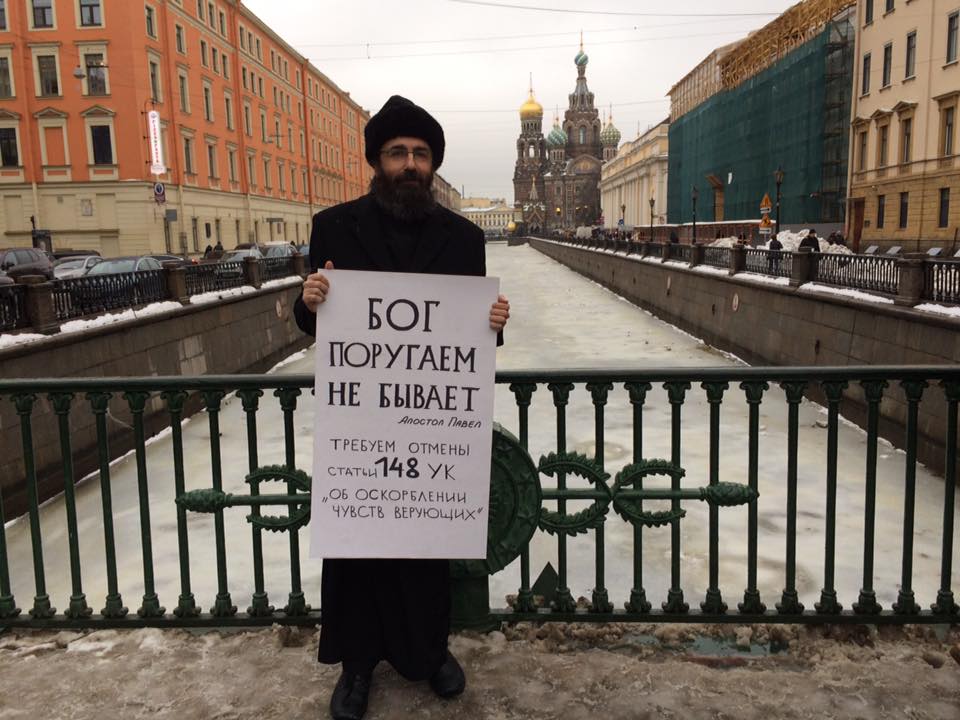Russia is a country inhabited by millions of different nationalities. Accordingly, they profess various religions. Often on the basis of a religious question, conflicts arise. So, in 2013, a law was passed in the Russian Federation that provides for punishment for insulting the feelings of believers. However, there are certain nuances in this law. For example, it is important to prove whether the acts of the offenders were indeed regarded as an insult to the rights of believers or their actions were legitimate.
What kind of action?
Insulting the feelings of believers, of course, is an acute issue in Russia. Often, representatives of various public organizations organize demonstrations of disregard for believers. What does this lead to? The question is rhetorical.
The Criminal Code of the Russian Federation spells out black and white cases for which punishment is provided for insulting the religious feelings of believers. It is possible to prosecute a violator of this law if he has committed the following actions:
- publicly expressed disrespect for believers (or representatives) of a particular religion (religious organization);
- making fun of various religious dogmas and canons;
- committed similar deeds in places for worship and ceremonies;
- hindered the activities of a religious association or its activities illegally.
Insult can take many forms. For example:
- spoken language;
- status on a personal page (comment) on social networks;
- Interview to the channel, a note in the media.
On the one hand, it might seem: what can be done so illegally to impede the activities of a religious organization? We can safely say that the actions of the violator (or group of people) contain a corpus delicti. As practice shows, in reality actions are manifested as follows:
- threat or use of violence;
- violation of the right to freedom of conscience and religion;
- damage (or destruction) of property or paraphernalia for rituals;
- refusal to register a religious association or even the commission of actions to close it.
Article 148 of the Criminal Code: features
What is this law? It is interesting that in the Criminal Code you will not find an article with the headline "For insulting the feelings of believers." This is directly an internal wording, which is contained in the text of article 148.

The object of the crime is the religious worldview of another person. At the same time, denomination is not taken into account. However, any religious society must be officially registered and its actions must not contradict the laws of the Russian Federation.
Article 148 of the Criminal Code has four parts. In the text of the article, lawyers distinguish two forms of violation of people's rights in the field of religion and freedom of conscience:
- Part one: public actions, which transparently regard the disrespect and insult of the religious feelings of another person.
- Part two: crime in sacred places for representatives of a particular religion.
Responsibility for insulting the feelings of believers comes from 16 years old.
Differences from related formulations
When reading this article, several questions immediately arise in the Criminal Code of the Russian Federation: are there any motives for such crimes as hooliganism, vandalism, murder, the signs of which are qualified in several articles at once? In this case, another article is needed? An example should be given for a detailed explanation.
So, a believer is in a room for religious purposes. He needs to focus on his thoughts, prayer in order to perform a certain ritual or achieve enlightenment. However, next to him at this moment is an attacker who verbally defames everything that is holy to the believer.On the one hand, no one kills anyone and does not produce physical impact. And nobody talks about vandalism. But at the same time a deep moral trauma is inflicted on the believer.
This is a vivid and fairly common case when the prescribed norms in article 148 are really necessary. Referring to the novelty of this law, it is worth noting that certain adjustments and clarifications are not ruled out.
What punishment awaits the guilty?
According to the law, public disrespectful statements and actions that are directed towards believers are punishable by such penalties.

Accused of insulting the feelings of believers may:
- to serve his sentence in places of detention for a period of 12 months;
- carry out forced labor (for a period of 12 months or less);
- performance of compulsory work up to 240 hours;
- pay a fine of up to 300 thousand rubles (or in the amount corresponding to the total income of the accused for 2 years or less).
How much they give for insulting the feelings of believers: the nature of actions
This is an important issue. Similar violations that were committed in special places for the implementation of services, rituals and ceremonies provide a prison term for insulting the feelings of believers in the form of:
- up to 3 years of restraint of liberty;
- performing forced labor for a period of 3 years;
- compulsory work, the duration of which does not exceed 480 hours;
- a fine of up to 500 thousand rubles. (or according to the convicted person’s income for 3 years).

If the offender conducted unlawful acts that impede the functioning of a religious association or the conduct of appropriate measures by them, then such penalties apply:
- arrest up to 90 days;
- Correctional work for up to 1 year (or less);
- performance of compulsory work (duration up to 360 hours);
- a fine of up to 300,000 rubles is imposed (or in the amount of the attacker's income for 2 years).
Obstruction of the work of a religious organization by an official who uses his official position and uses threats and violence is punishable by such a degree of responsibility:
- imprisonment for a period of 12 months with the condition of depriving a convicted person of the right to work in this position for 2 years (or less)
- fulfillment of compulsory (not more than 12 months), corrective (not more than 2 years) and compulsory labor (not more than 2 years);
- recovery of a fine of up to 200 thousand rubles. (or the total income of the convicted person within 1 year).
When is it permissible to impede the activities of a religious association?
However, there are also cases when it is even necessary to hinder the work of a religious organization. Illegal actions of leaders and community members are:
- compulsion to destroy a family;
- encroachment on personal freedom and human rights;
- extremist acts;
- obstruction of compulsory secondary education;
- coercion of the organization's members to carry out illegal acts;
- inclination to suicide or refusal of medical care when it is needed;
- in violation of public order and measures taken to ensure the safety of citizens;
- when damaging the moral or health of community members;
- the use of narcotic, psychotropic, hypnotic drugs in the actions of a religious organization;
- obstruction of secession through threats and violence.

The above cases of the activity of a religious organization are classified not only as a crime, but also as a basis for criminalizing the participants and leaders of such a community.
Amendments to the law
For insulting the feelings of believers (punishment can be attributed to criminal liability), comes only in individual cases. That is why, since June 2016, the legislature has been amending the law to obtain accurate wording and optimization.
It should be added that in the article there are two separate corpus delicti. The first is public acts that express disrespect for a religious society. By the way, the feelings of atheists or agnostics are not protected by law. In the second part of the article - the qualification of the crime at the place (special premises for rituals and services). So, the obstructive actions include:
- refusal to register a religious community;
- deliberate closure of an object for worship.

Also, in the column “criminal acts” with the use of violence or threat, it is necessary to clarify that such actions qualify for the degree of severity (moderate or causing serious harm to the health of citizens).
Paradoxical cases
By the way, there are many who have already been sent to prison for insulting the feelings of believers. In a number of cases, another question arises: about freedom of speech and self-expression.
“There is no God,” many say. By the way, quite famous blogger Viktor Krasnov in 2014 posted this entry on his page. For this, in March of the same year he was invited to a court hearing.
Among the offended believers, Dmitry Enteo-Tsorionov stands out clearly. He is the leader of the God's Will group. Dmitry saw “Unkind” in such ambiguous places as:
- in the sculpture of the late WWII veteran, which was exhibited in the Manege;
- in the art object "Eye of Sauron";
- in a T-shirt with the inscription Pussy Riot;
- in a number of performances;
- in personal statements of people about his companions.
This list goes on and on. However, attempts to institute criminal proceedings against the “offenders” are failing. Paradoxically, the actions of Dmitry Enteo-Zorionov himself more than once fell under other articles of the law.
Criminal cases to insult the feelings of believers are extremely rare in court proceedings. So, one resident of Izhevsk posted on his page in the social network a post with a picture of insulting content to Muslims. The verdict was passed - 200 hours of compulsory work, and this is more than 8 days.
For another active user on the Web, the usual verbal skirmish ended with examination, investigation and other actions by executive authorities.
Many people remember the punk prayer. It was organized by members of the Pussy Rayot group. However, during the investigation 148, the article sounded differently, therefore it was not presented as a basis for detention and subsequent punishment.
"God does not scold": protests of believers
“It is impossible to insult the feelings of a believer”, “The feelings of believers are protected by the Lord, not the Criminal Code,” Orthodox activists-believers came out with protests. Many activists disagree with this article in the law, because it directly contradicts the gospel saying: "Love your enemies, bless those who curse you."

This is not the only protest of believers. Fortunately, no one detained Orthodox activists. The police only took the personal data of the activists.
What should believers do when insulting them?
Any law in its practical application raises many questions. Let's look at the points.
Where to go for help?
Each offensive act or public display of disrespect is automatically recognized as a violation of law and order. It is logical that you need to contact the police. Accordingly, you will have to write a written appeal. And in case of an attack, immediately call the police.
How to prove?
Article 148 of the Criminal Code of the Russian Federation “Insulting the feelings of believers” refers to public disrespectful acts. Accordingly, the best defense is collecting evidence. Usually there are always victims. Better to find witnesses. They can be ordinary passers-by, car drivers who have video recorders.
Complaint: how to draw up and where to file?
There is no strict regulatory form when writing a complaint. However, you must specify the following data:
- who exactly committed the illegal actions (if the person is unknown, then you will need to describe him as detailed as possible);
- for what specific illegal actions: words, deeds;
- list specific individuals who have been affected.
It is possible that the perpetrator will be charged under several articles of the Criminal Code.

If you personally noticed that they offend the feelings of believers on pages on social networks, then immediately contact the site administration. In every society, it is important not only to know the existence of a law, but also to understand it.
Why are people so angry with each other that they offend religious feelings? Psychologists call this behavior neurotic. And the blame for everything is the experienced humiliation in the past. No wonder they say that the origins of all our problems are stored in childhood. Indeed, simply in our mentality and culture, mutual respect is often lacking. Be tolerant and humane! Remember that the word is not a sparrow - it will fly out, you will not catch it.
